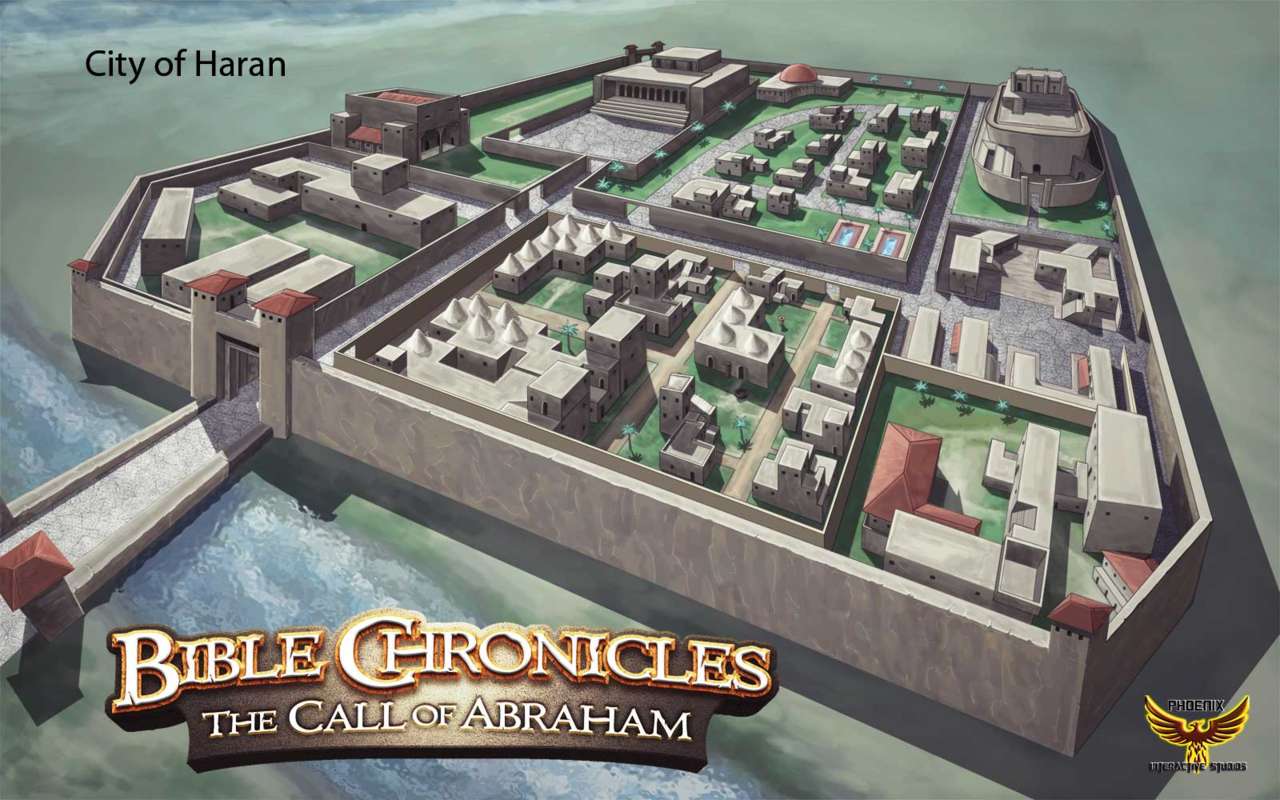Why Are Bible Games Never Very Good?
Have faith, The Call of Abraham developer says.
"It's no surprise that a great many gamers are averse to anything associated with God or the Bible," Martin Bertram tells me about his latest project, Bible Chronicles: The Call of Abraham, when I ask about the colorful response to our news story regarding his game's recently launched Kickstarter campaign.
Our story generated 500+ comments, many of which belittled the Kickstarter campaign and challenged its ambition, that is, to "stir hunger for God's word."

Bertram, cofounder of developer Phoenix Interactive Studios in Bakersfield, California, explained to me recently that he knows what he's up against with The Call of Abraham, but he's not afraid. If the game can rise above the challenges it faces, he believes it could be a breakthrough moment for Christian-themed video games.
But to do that, The Call of Abraham will need to break free of the history of mediocrity that Christian games have suffered through. He's hoping the game's "top notch" visuals, its Biblical accuracy (thanks to an advisory board of local pastors), and its effort to make sure it doesn't feel like a virtual church service will help the game succeed.
In the interview below, Bertram and other Phoenix Interactive founder Richard Gaeta explain why Christians and non-Christians alike will enjoy The Call of Abraham, where Bible-based games have stumbled in the past, and whether or not we'll see the likes of Activision or Electronic Arts getting into Christian games in the future.
The Kickstarter campaign for Bible Chronicles: The Call of Abraham has currently raised just over $16,000 of its $100,000 goal. The game has also been submitted to Steam Greenlight.
GameSpot: The news story we wrote on Call of Abraham drew an overwhelmingly negative response from our readers. Does this bother you?
Martin Bertram: It's no surprise that a great many gamers are averse to anything associated with God or the Bible, nor that those would be the most vocal. Where once it was the rebellious and counter-cultural thing in America to eschew God publicly, now it is more of the opposite. On the contrary, it is exciting to see the number of people on GameSpot and on Steam who have publicly expressed support or interest, some of whom even profess to be atheists. It shows a real measure of courage and independent thinking to do so when the herd mentality is to simply mock and jeer.
GS: Why are there so few examples of well-received and commercially successful Christian-themed video games, especially when the "install base" of Christians is so large?
Richard Gaeta: There are multiple hurdles that a Christian-themed video game needs to clear in order to make all of its marks. First, it needs to reflect the Bible accurately. Second, the messaging and gameplay needs to appeal to the largest market segment: Christian parents. Finally, it has to be engaging and fun for the players. The pursuit of creating a game that gets these three points right has led to all kinds of misfires. Aiming to please everyone, they pleased no one.
"The Bible is replete with rich and meaningful stories of old, which have never been well captured in a video game. The potential to be able to not only learn about the people and events of the Bible but to experience and interact with them is huge."
GS: Numerous Biblical figures and events would seem to make for a great video game. Things like St. Paul's life, Noah, or even the Passion I could be compelling for the masses. Why hasn't it happened yet?
MB: For the same reasons that there have been so few successful Christian-themed video games, the industry has been left in a state of limbo, so much so that many are declaring that the Bible and video games can't work together. That, of course, is ridiculous. The problem there is a lack of vision which is common in many spheres even beyond games; an inability to see beyond the status quo.
GS: Why would a Christian-themed game be more rewarding, as you claim, than some game like Uncharted or Halo that makes no evangelical statement?
RG: The Bible is replete with rich and meaningful stories of old, which have never been well captured in a video game. The potential to be able to not only learn about the people and events of the Bible but to experience and interact with them is huge. With the understanding that we can only re-create the cultures and environments as best as possible with the information available, the player can relate to the stories in a deeper way which would otherwise require not only reading the Bible, but researching numerous other historical texts and archaeological works. With a game like Call of Abraham, a player can gain all of that just by playing.
GS: In your game, you can only commit an act of violence if it is honorable, as you say. How do you determine what is honorable or not?
MB: Many games reward the player for killing and destroying everything that they can. Call of Abraham rewards the players for conducting themselves honorably. Combat has a place in the game as it does in reality, and the Bible teaches this. Defending the weak, the innocent, one’s home or one’s self from attack, for example. Furthermore, not all combat situations need to end in death. The player is rewarded for demonstrating wisdom and temperance, and a respect for life.
GS: You don't actually play as Abraham himself in Call of Abraham; can you explain the thinking behind putting the player into the shoes of a member of his caravan instead of Abraham himself?
RG: We recognized that allowing the player to be Abraham would cause issues with the story unfolding as told in the Bible, which would compromise either the ability to ensure biblical accuracy, or the ability of the player to make decisions. The player character is a fictional Elamite outcast who finds work with Abraham's caravan before departing Haran. Elam was the rising power in the region at that time. The background story of the player character unfolds as the game progresses, and compliments the main story of Abraham's journey.
GS: What is your ultimate aspiration for Call of Abraham?
MB: Our ultimate aspiration is to produce an interactive representation of the story of Abraham that is true to the Bible, and brings people closer to the God of the Bible.
GS: Do you think a Christian and a non-Christian would both enjoy the game?
RG: Absolutely! The playability of the game and intrigue of its story line will not take the player's perspective for granted. Whether you are a Christian or not, whether you believe the Bible is true or not, you will enjoy the adventure, the scenery, and the challenges you will face in the course of helping Abraham on his journey as told in the Bible.

GS: I spoke with Father James Martin of America Magazine about this topic, and he brought to mind the fact that experiences of God often come in groups. But Call of Abraham is a single-player only game. Why not include multiplayer?
MB: We considered multiplayer, but we opted against it for this first title. We're already breaking new ground, and we wanted to ensure the focus was going to be on an immersive adventure that brings the player deep into the story. The camaraderie of playing with friends can distract from that. This has been our experience anyway from over 30 years of gaming. We are working on plans to incorporate multiplayer functionality in some future titles.
GS: What are you going to do if your Kickstarter campaign comes up short?
RG: We believe that the campaign will succeed and we are walking by our faith in God day by day, even as Abraham did. God already knows if it will succeed or come up short, and if it does, He will lead us where to go next as we continue our faith journey to bring the game to completion.
We aren't adding to the story anything that would be out of place, as some games have in the past, to where you are going to feel like you’re attending a church service.
GS: I've played some of the Adam's Venture games, and while I enjoyed the visuals, the game came across as maybe too "preachy." In Call of Abraham, where do you draw the line between infusing the story with God's message and making fun gameplay?
MB: We draw the line where the Bible draws it. We aren't adding to the story anything that would be out of place, as some games have in the past, to where you are going to feel like you're attending a church service. We are simply going to tell the story of Abraham as the Bible does, and we'll let God do with that what He will in the hearts and minds of the players.
GS: Some of the most popular games today are the most violent ones; we're sucked in by this 'power fantasy' phenomenon. If not violence, then what is the "hook" for Call of Abraham?
RG: Many of the most popular games today overdose players on violence and head pounding action. The Call of Abraham will give players the thrills and suspense of an epic adventure, filled with honor, mystery, combat, hope, and despair that is able to stand on its engaging storyline rather than the incessant banging of the game controller.
GS: Do you think any of the mega-publishers like Activision or Electronic Arts would be on-board to publish a Christian-themed game?
MB: We can't really say whether or not they would, or even if they should. It may or may not be in their best interests, or in that of the game. These companies after all have their own visions for the kinds of games they are comfortable with and want to be a part of. From a business perspective, it might make sense.
GS: I have the Bible app installed on my phone right now and everyone once in a while I'll get a notification and it will play church bells. So it seems to me like God is capable of reaching people wherever they are, even today when our lives are filled with so many distractions. Do you think games like Call of Abraham could help encourage the Church to think about using games as a means for evangelization?
RG: Games have been used as tools in various segments of the secular industry for years. The public school system uses them to teach our children academic concepts. The more we speak and engage with the Pastors from various churches across the area we find that there is an increasing consensus amongst them realizing that video games are a tool that are being played several hours a day by our youth and would be well served to use that time engaging in games that hold true to biblical teaching vs. what's out there now. Although there are a plethora of Sunday School type games that are aimed at a younger audience, it is our young adults that are influenced heavily on a daily basis by the video game market. We hope to have Call of Abraham be the first in a long line of entertaining and spiritually based games that will stir a hunger in our youth for God's word.
Got a news tip or want to contact us directly? Email news@gamespot.com
Join the conversation